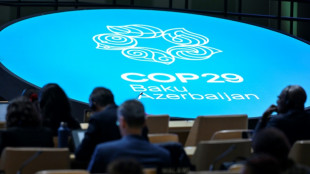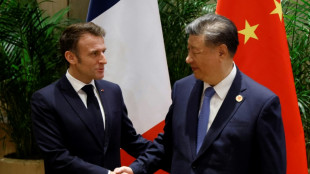
-
 US announces talks with Israel over civilian casualties in Gaza
US announces talks with Israel over civilian casualties in Gaza
-
SpaceX fails to repeat Starship booster catch, as Trump looks on

-
 G20 summit ends with Ukraine blame game
G20 summit ends with Ukraine blame game
-
Trump appoints TV celebrity 'Dr. Oz' to key US health post

-
 European stocks fall on Ukraine-Russia fears, US focused on earnings
European stocks fall on Ukraine-Russia fears, US focused on earnings
-
Last-gasp Szoboszlai penalty rescues Hungary draw with Germany

-
 Germany, Netherlands draw as Nations League group stage ends
Germany, Netherlands draw as Nations League group stage ends
-
Hong Kong tycoon Jimmy Lai takes witness stand in collusion trial

-
 Guardiola set to extend stay as Man City boss - reports
Guardiola set to extend stay as Man City boss - reports
-
Minnows Botswana hold Egypt to qualify with Mozambique, Tanzania

-
 Inter Miami coach Martino leaving club for 'personal reasons' - club source
Inter Miami coach Martino leaving club for 'personal reasons' - club source
-
Chinese man sentenced to 20 months for Falun Gong harassment in US

-
 Hong Kong court jails 45 democracy campaigners, drawing condemnation
Hong Kong court jails 45 democracy campaigners, drawing condemnation
-
'I did it for Rafa': Alcaraz after keeping Spain Davis Cup dream alive

-
 Alcaraz keeps Spain and Nadal Davis Cup dream alive
Alcaraz keeps Spain and Nadal Davis Cup dream alive
-
Trump names China hawk Howard Lutnick commerce secretary

-
 Europe's pivotal role in bid to strike COP29 climate deal
Europe's pivotal role in bid to strike COP29 climate deal
-
MotoGP champion Martin falls on Aprilia debut

-
 Bodies burned after Haiti police, civilians kill 28 alleged gang members
Bodies burned after Haiti police, civilians kill 28 alleged gang members
-
'Probably my last match': Nadal after Davis Cup singles defeat

-
 Iran faces new censure over lack of cooperation at UN nuclear meeting
Iran faces new censure over lack of cooperation at UN nuclear meeting
-
Afghan woman teacher, jailed Tajik lawyer share top rights prize

-
 Pressure mounts on Scholz over bid for second term
Pressure mounts on Scholz over bid for second term
-
Take two: Biden makes it into G20 leaders' photo

-
 Russia vows response after Ukraine fires long-range US missiles
Russia vows response after Ukraine fires long-range US missiles
-
Spain's Nadal loses in Davis Cup quarter-finals singles opener

-
 Four elite Brazil officers arrested over alleged 2022 Lula murder plot
Four elite Brazil officers arrested over alleged 2022 Lula murder plot
-
SpaceX set for Starship's next flight -- with Trump watching

-
 Trump ally seeks to block trans lawmaker from women's restrooms
Trump ally seeks to block trans lawmaker from women's restrooms
-
Slovakia oust Britain to meet Italy in BJK Cup title match

-
 Top-selling daily French daily Ouest-France stops posting on X
Top-selling daily French daily Ouest-France stops posting on X
-
Russian invasion toll on environment $71 billion, Ukraine says

-
 'Sabotage' suspected after two Baltic Sea cables cut
'Sabotage' suspected after two Baltic Sea cables cut
-
'You will die in lies!': daughter clashes with father at French rape trial

-
 Spain Women drop veterans Paredes and World Cup kiss victim Hermoso
Spain Women drop veterans Paredes and World Cup kiss victim Hermoso
-
Stocks diverge on fears of Ukraine-Russia escalation

-
 New Botswana leader eyes cannabis, sunshine to lift economy
New Botswana leader eyes cannabis, sunshine to lift economy
-
'Operation Night Watch': Rembrandt classic gets makeover

-
 Haiti police, civilians kill 28 gang members: authorities
Haiti police, civilians kill 28 gang members: authorities
-
Taxing the richest: what the G20 decided

-
 'Minecraft' to come to life in UK and US under theme park deal
'Minecraft' to come to life in UK and US under theme park deal
-
IMF, Ukraine, reach agreement on $1.1 bn loan disbursement

-
 Japan on cusp of World Cup as Son scores in Palestine draw
Japan on cusp of World Cup as Son scores in Palestine draw
-
Chelsea condemn 'hateful' homophobic abuse towards Kerr, Mewis

-
 Hamilton to race final three grands prix of Mercedes career
Hamilton to race final three grands prix of Mercedes career
-
Gatland has not become a 'bad coach' says Springboks' Erasmus

-
 Slovakia take Britain to doubles decider in BJK Cup semis
Slovakia take Britain to doubles decider in BJK Cup semis
-
Brazil arrests soldiers over alleged 2022 Lula assassination plot

-
 Ukraine war and climate stalemate loom over G20 summit
Ukraine war and climate stalemate loom over G20 summit
-
Ukraine fires first US long-range missiles into Russia


Why is Mexico's judicial reform plan so controversial?
Judicial reforms championed by Mexico's outgoing president, Andres Manuel Lopez Obrador, and supported by his incoming successor have sparked diplomatic tensions with the United States and upset financial markets.
Here are the key points of the proposals, which will be debated in the ruling-party-dominated Congress, due to convene on Sunday:
- What's the plan? -
Lopez Obrador wants Supreme Court and other judges and magistrates to be elected by popular vote, arguing that the judiciary now serves the interests of the political and economic elite.
Candidates would be proposed by the executive, legislative and judicial branches of government.
At present, Supreme Court justices are nominated by the president and ratified by the Senate.
Judges and magistrates are appointed by the Federal Judicial Council, an administrative body.
The proposals, which are supported by president-elect Claudia Sheinbaum, who will take office on October 1, would reduce the number of Supreme Court judges from 11 to nine.
Their terms of office would be shortened from 15 years to 12.
A new body would be formed to supervise judges, in a country where the rate of impunity -- of being able to avoid accountability for crimes -- stands at 99 percent, according to the non-governmental organization Impunidad Cero.
The system would have similarities to that of Bolivia, where members of the high courts are elected by popular vote.
Some states in the United States use elections to select judges. In Switzerland, judges are chosen by voters at the local level.
- Why the controversy? -
Opposition politicians, judges and judicial employees say that the reforms would politicize the justice system and compromise the separation of powers between the branches of government.
Margaret Satterthwaite, United Nations special rapporteur on the independence of judges and lawyers, has also voiced "deep concerns" about the plan's "broad implications for judicial independence across Mexico."
"I urge the authorities to carefully reconsider the proposal, giving appropriate weight to the human rights guarantee of judicial independence," she wrote on social media platform X.
Human Rights Watch urged lawmakers to reject what it called the "dangerous proposals," saying they would "seriously undermine judicial independence and contravene international human rights standards."
The New York-based rights group expressed concern that the reforms would also eliminate restrictions on the military carrying out civilian law enforcement.
"Given Mexico's long history of serious human rights violations and official cover-ups, legislators should be taking steps to strengthen human rights protections, not weaken them," it said.
- What's the diplomatic fallout? -
US Ambassador to Mexico Ken Salazar has warned that the changes would "threaten" a trade relationship between the neighboring countries that "relies on investors' confidence in Mexico's legal framework."
The reforms could pose "a major risk to the functioning of Mexico's democracy," he told journalists.
In particular, they could "make it easier for cartels and other bad actors to take advantage of politically motivated and inexperienced judges," Salazar said.
Canada, also a member of the major free trade partnership with the United States and Mexico, has for its part said investors are worried.
"They want stability, they want a judicial system that works if there are problems," Canadian Ambassador Graeme Clark said.
In response, Lopez Obrador announced a "pause" in relations with the US and Canadian embassies, criticizing the ambassadors' statements as "interventionist."
- Why are markets nervous? -
Several investment firms have warned that curbing the independence of the judiciary would affect the resolution of conflicts between the government and the private sector.
The changes would "lead to heightened uncertainty" about the legal operating environment, British consultancy firm Capital Economics wrote in a note to clients.
"The politicization of the justice system could raise concerns about whether disputes between businesses and the government would be resolved in an impartial manner," it said.
Since Sheinbaum, a close ally of Lopez Obrador, won a landslide election victory June 2, the Mexican peso has fallen by around 16 percent against the dollar.
The drop reflects "concerns about the country's economic stability... and also the perception of risk that foreign investors are beginning to attribute to Mexico," Ramse Gutierrez, co-director of investments at asset manager Franklin Templeton, told AFP.
M.White--AT
